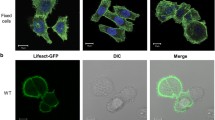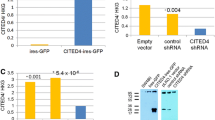Abstract
Purpose
During colorectal cancer progression, the loss of differentiation and cell–cell adhesion as well as a higher migratory potential are well-defined features; however, the signaling mechanism governing these events is not fully elucidated. The aim of this study was to investigate the role that PI3K and downstream effectors play in controlling colon cancer malignant phenotypes.
Methods
HCT-116 cells, a human model of colon cancer, which are highly metastatic and undifferentiated, were treated with LY294002, a specific inhibitor of PI3K. Cell differentiation and apical junctional complex (AJC) formation were monitored using alkaline phosphatase and electron microscopy analysis. Immunofluorescence and Western blotting were used to accompany the subcellular localization of AJC proteins. PI3K downstream molecules were analyzed by western blotting, and proliferation, wound healing, and colony formation techniques to determine malignant phenotype alterations.
Results
PI3K inhibition increased alkaline phosphatase activity, led to an enterocyte-like growth and formed a functional AJC. LY294002 treatment was able to recruit E-cadherin, β-catenin, claudin-3, and ZO-1 to the cell–cell contact region, and this effect was essential for AJC assembly and association of these proteins to the cytoskeleton. Furthermore, we provided evidence that PI3K inhibition leads to a decrease in p-Akt and p-GSK-3β and increased p-β-catenin levels, which in turn controlled cell proliferation, motility, and colony formation.
Conclusion
Our results demonstrate that PI3K/Akt and GSK-3β prevents in a differential fashion the malignant phenotype of HCT-116 colorectal cancer cells, which could constitute a potential therapeutic target for treatment of this cancer type.






Similar content being viewed by others
References
Cantley LC (2002) The phosphoinositide 3-kinase pathway. Science 296:1655–1657. doi:10.1126/science.296.5573.1655
Cereijido M, Contreras RG, Shoshani L, Florez-Benitez D, Larre I (2008) Tight junction and polarity interaction in the transporting epithelial phenotype. Biochim Biophys Acta 1778:770–793. doi:10.1016/j.bbamem.2007.09.001
Chae B, Yang KM, Kim TI, Kim WH (2009) Adherens junction-dependent PI3K/Akt activation induces resistance to genotoxin-induced cell death in differentiated intestinal epithelial cells. Biochem Biophys Res Commun 378:738–743. doi:10.1016/j.bbrc.2008.11.120
Chantre I, Barbat A, Dussaulx E, Brattain MG, Zweibaun A (1988) Epithelial polarity, villin expression, and enterocytic differentiation of cultured human colon carcinoma cells: a survey of twenty cell line. Cancer Res 48:1936–1942
Datta SR, Brunet A, Greenberg ME (1999) Cellular survival: a play in three Akts. Genes Dev 13:2905–2927
Gavert N, Ben-Ze’ev A (2008) Epithelial-mesenchymal transition and the invasive potential of tumors. Trends Mol Med 14:199–209. doi:10.1016/j.molmed.2008.03.004
Hanahan D, Weinberg RA (2000) The hallmark of cancer. Cell 100:57–70
He XC, Zhang J, Tong G, Tawfik O, Ross J, Scoville DH, Tian Q, Zeng X, He X, Wiedemann LM, Mishina Y, Li L (2004) BMP signaling inhibits intestinal stem cell self-renewal through suppression of Wnt-beta-catenin signaling. Nat Genet 36:1117–1121. doi:10.1038/ng1430
Huber MA, Kraut N, Beug H (2005) Molecular requirements for epithelial-mesenchymal transition during tumor progression. Curr Opin Cell Biol 17:548–558. doi:10.1016/j.ceb.2005.08.001
Jiao W, Miyazaki K, Kitajima Y (2001) Exogenous expression of E-cadherin in gallbladder carcinoma cell line G-415 restores its cellular polarity and differentiation. Int J Oncol 19:1099–1107
Khaleghpour K, Li Y, Banville D, Yu Z, Shen SH (2004) Involvement of the PI3-kinase signaling pathway in progression of colon adenocarcinoma. Carcinogenesis 25:241–248
Lapham A, Adams JE, Paterson A, Lee M, Brimmell M, Packham G (2009) The Bcl-w promoter is activated by beta-catenin/TCF4 in human colorectal carcinoma cells. Gene 432:112–117. doi:10.1016/j.gene.2008.12.002
Laprise P, Chailler P, Houde M, Beaulieu JF, Boucher MJ, Rivard N (2002) Phosphatidylinositol 3-kinase controls human intestinal epithelial cell differentiation by promoting adherens junction assembly and p38 MAPK activation. J Biol Chem 277:8226–8234. doi:10.1074/jbc.M110235200
Lin KH, Guh JY, MoJF ChiouSJ, Hwang CC, Chuang LY (2008) Advanced glycation end-product-inhibited cell proliferation and protein expression of beta-catenin and cyclin D1 are dependent on glycogen synthase kinase 3beta in LLC-PK1 cells. Arch Biochem Biophys 477:27–32. doi:10.1016/j.abb.2008.04.025
Liu H, Radisky DC, Wang F, Bissell MJ (2004) Polarity and proliferation are controlled by distinct signaling pathways downstream of PI3-kinase in breast epithelial tumor cells. J Cell Biol 164:603–612. doi:10.1083/jcb.200306090
Matter K, Balda MS (2007) Epithelial tight junctions, gene expression and nucleo-junctional interplay. J Cell Sci 120:1505–1511. doi:10.1242/10.1242/jcs.005975
Miller SJ, Lavker RM, Sun T (2005) Interpreting epithelial cancer biology in the context of stem cells: tumor properties and therapeutic implications. Biochim Biophys Acta 1756:25–52. doi:10.1016/j.bbcan.2005.07.003
Nakayama M, Hisatsune J, Yamasaki E, Isomoto H, Kurazono H, Hatakeyama M, Azuma T, Yamaoka Y, Yahiro K, Moss J, Hirayama T (2009) Helicobacter pylori VacA-induced inhibition of GSK3 through the PI3K/Akt signaling pathway. J Biol Chem 284:1612–1619. doi:10.1074/jbc.M806981200
Pylayeva Y, Gillen KM, Gerald W, Beggs HE, Reichardt LF, Giancotti FG (2009) Ras- and PI3K-dependent breast tumorigenesis in mice and humans requires focal adhesion kinase signaling. J Clin Invest 119:252–266. doi:10.1172/JCI37160
Rychahou PG, Jackson LN, Silva SR, Rajaraman S, Evers BM (2006) Targeted molecular therapy of the PI3K pathway: therapeutic significance of PI3K subunit targeting in colorectal carcinoma. Ann Surg 243:833–842. doi:10.1097/01.sla.0000220040.66012.a9
Samuel Y, Ericson K (2006) Oncogenic PI3K and its role in cancer. Curr Opin Oncol 18:77–82. doi:10.1097/01.cco.0000198021.99347.b9
Sheng H, Shao J, Townsend CM Jr, Evers BM (2003) Phosphatidylinositol 3-kinase mediates proliferative signals in intestinal epithelial cells. Gut 52:1472–1478
Simonn-Assmann P, Turck N, Sidhoum-Jenny M, Gradwohl G, Kedinger M (2007) In vitro models of intestinal cell differentiation. Cell Biol Toxicol 23:241–256. doi:10.1007/s10565-006-0175-0
Stambolic V, Woodgett JR (2006) Functional distinctions of protein kinaseB/Akt isoforms defined by their influence on cell migration. Trends Cell Biol 16:461–466. doi:10.1016/j.tcb.2006.07.001
Tanos B, Rodriguez-Boulan E (2008) The epithelial polarity program: machineries involved and their hijacking by cancer. Oncogene 27:6939–6957. doi:10.1038/onc.2008.345
Thiery JP, Sleeman JP (2006) Complex networks orchestrate epithelial-mesenchymal transitions. Nat Rev Mol Cell Biol 7:131–142. doi:10.1038/nrm1835
Tsukita S, Yamazaki Y, Katsuno T, Tamura A, Tsukita S (2008) Tight junction-based epithelial microenvironment and cell proliferation. Oncogene 27:6930–6938. doi:10.1038/onc.2008.344
Vaidya RJ, Ray RM, Johnson LR (2006) Akt-mediated GSK-3β inhibition prevents migration of polyamine-depleted intestinal epithelial cells via Rac1. Cell Mol Life Sci 63:2871–2879. doi:10.1007/s00018-006-6379-x
Vlad A, Röhrs S, Klein-Hitpass L, Müller O (2008) The first five years of the Wnt targetome. Cell Signal 20:795–802. doi:10.1016/j.cellsig.2007.10.031
Vlahos CJ, Matter WF, Hui KY, Brown RF (1994) A specific inhibitor of phosphatidylinositol 3-kinase, 2-(4-morpholinyl)-8-phenyl-4H–1-benzopyran-4-one (LY294002). J Biol Chem 269:5241–5248
Wang Q, Wang X, Hernandez A, Kim S, Evers BM (2001) Inhibition of the phosphatidylinositol 3-kinase pathway contributes to HT29 and Caco-2 intestinal cell differentiation. Gastroenterology 120:1381–1392. doi:10.1053/gast.2001.24044
Wang J, Rajput A, Kan JL, Rose R, Liu XQ, Kuropatwinski K, Hauser J, Beko A, Dominquez I, Sharratt EA, Brattain L, Levea C, Sun FL, Keane DM, Gibson NW, Brattain MG (2009) Knockdown of Ron kinase inhibits mutant phosphatidylinositol 3-kinase and reduces metastasis in human colon carcinoma. J Biol Chem 284:10912–10922. doi:10.1074/jbc.M809551200
Wu H, Wang S, Weng D, Xing H, Song X, Zhu T, Xia X, Weng Y, Xu G, Meng L, Zhou J, Ma D (2008) Reversal of the malignant phenotype of ovarian cancer A2780 cells through transfection with wild-type PTEN gene. Cancer Lett 271:205–214. doi:10.1016/j.canlet.2008.06.018
Acknowledgments
This research was supported by Fundação do Câncer, Ministério da Saúde (MS-Brazil), Fundação Carlos Chagas Filho de Amparo à Pesquisa do Estado do Rio de Janeiro (FAPERJ), Conselho Nacional de Desenvolvimento Científico e Tecnológico (CNPq), and Programa de Cooperação INCA/FIOCRUZ. We thank Dr. Marcelo Pelajo of the Pathology Laboratory, Fiocruz for assistance with confocal microscopy.
Conflict of interest statement
We declare that we have no conflict of interest.
Author information
Authors and Affiliations
Corresponding author
Rights and permissions
About this article
Cite this article
de Araújo, W.M., Vidal, F.C.B., de Souza, W.F. et al. PI3K/Akt and GSK-3β prevents in a differential fashion the malignant phenotype of colorectal cancer cells. J Cancer Res Clin Oncol 136, 1773–1782 (2010). https://doi.org/10.1007/s00432-010-0836-5
Received:
Accepted:
Published:
Issue Date:
DOI: https://doi.org/10.1007/s00432-010-0836-5




